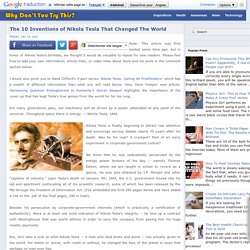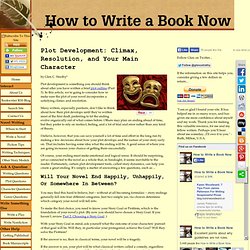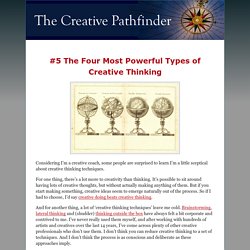

Soy un ladrón. Second. Why Don't You Try This?: The 10 Inventions of Nikola Tesla That Changed The World. Note: This article was first posted some time ago, but in honor of Nikola Tesla's birthday, we thought it would be valuable to repost for new readers.

Please feel free to add your own information, article links, or video links about Tesla and his work in the comment section below. I would also point you to Rand Clifford's 3-part series: Nikola Tesla: Calling All Freethinkers! Which has a wealth of different information than what you will read below. Also, Dave Hodges' new article: Harnessing Quantum Entanglement Is Humanity’s Secret Weapon highlights the importance of the cover-up that has kept Tesla's true genius from the world for far too long. Ere many generations pass, our machinery will be driven by a power obtainable at any point of the universe. Nikola Tesla is finally beginning to attract real attention and encourage serious debate nearly 70 years after his death.
But, let's take a look at what Nikola Tesla -- a man who died broke and alone -- has actually given to the world. NIKOLA TESLA. Zaption - Interact With Video. Irish Names. Theorie der multiplen Intelligenzen. Die Theorie der multiplen Intelligenzen ist eine Intelligenztheorie, die Howard Gardner in den 1980er Jahren entwickelt hat, weil nach seiner Überzeugung die klassischen Intelligenztests nicht ausreichen, um Fähigkeiten zu erkennen (und entsprechend zu fördern), die über den Erfolg im Leben in verschiedenen kulturellen Umfeldern (bzw.

Genie. Klugheit. Fresken in der Galerie des Palazzo Medici-Riccardi in Florenz, Szene: Prudenzia Klugheit (griechisch φρόνησις phrónesis Vernunft, lat. prudentia) ist die Fähigkeit zu angemessenem Handeln im konkreten Einzelfall unter Berücksichtigung aller für die Situation relevanten Faktoren, individueller Handlungsziele und sittlicher Einsichten.

Seit Platon zählt die Klugheit zu den vier Kardinaltugenden. Kant hält sie für ein pragmatisches Wissen um die der Beförderung der eigenen Glückseligkeit dienlichen Mittel, womit der Begriff eher die Bedeutung der „Verständigkeit“ annimmt. Klugheit ist in zwei Richtungen abzugrenzen: Im Gegensatz zum auf das Allgemeine gerichteten Wissen (griech. epistéme) richtet sich die Klugheit auf den einzelnen konkreten Fall mit der Absicht, in ethischer Hinsicht das Gute, Zuträgliche und Angemessene zu erreichen. Auf der anderen Seite grenzt sie ihre Bindung an die moralische Lebensführung von Schlauheit, Gerissenheit, Tücke und Verschlagenheit ab. Deciding How We Age as We Age. Seth Cochran If someone asked me to describe the Transhumanists I know in one word, I would say “ambitious”.

We have some pretty lofty goals- immortality, mind enhancement, uploading. But ambition isn’t always enough. Plot Development: How to write the climax and ending of your novel. By Glen C.

Strathy* Plot development is something you should think about after you have written a brief plot outline (Part 3). 201 Ways to Arouse Your Creativity. Arouse your creativity Electric flesh-arrows … traversing the body.

Musings on British Literature: 1790 to Present: Themes in The God of Small Things. In The God of Small Things, there are two central themes.

One of these themes is memory, or the act of forgetting, most specifically Estha’s deliberate forgetting. Related to the theme of memory is time and its different aspects: captured time and the subjectivity of time. I found Estha’s forgetting, or as he calls it, "hoovering" his mind, to be one of the most compelling themes. He does it because of one particular memory, the memory of when he told the police that Velthua kidnapped him and Rahel. Inglorious Enterprise. Postcolonial Literature. Main page | 20th-century literature | some postcolonial authors | Filipino-American literature Introduction & Definition "After Iraq: Reframing Postcolonial Studies.

" Editorial by Priyamvada Gopal and Neil Lazarus. New Formations 59. "'Postcolonial Literature': Problems with the Term. " "Introduction to Postcolonial Studies. " Literary Criticism. #5 The Four Most Powerful Types of Creative Thinking. Considering I’m a creative coach, some people are surprised to learn I’m a little sceptical about creative thinking techniques.

For one thing, there’s a lot more to creativity than thinking. It’s possible to sit around having lots of creative thoughts, but without actually making anything of them. But if you start making something, creative ideas seem to emerge naturally out of the process. So if I had to choose, I’d say creative doing beats creative thinking. And for another thing, a lot of ‘creative thinking techniques’ leave me cold. Having said that, here are four types of creative thinking that I use myself and which I know for a fact are used extensively by high-level creators. The text below introduces the four types of creative thinking, and the worksheet will show you how to apply the techniques to your own work. 1. Image by stuartpilbrow. Upload & Share PowerPoint presentations and documents. AudioKiosko, podcast, radio, mp3 y más - iVoox.